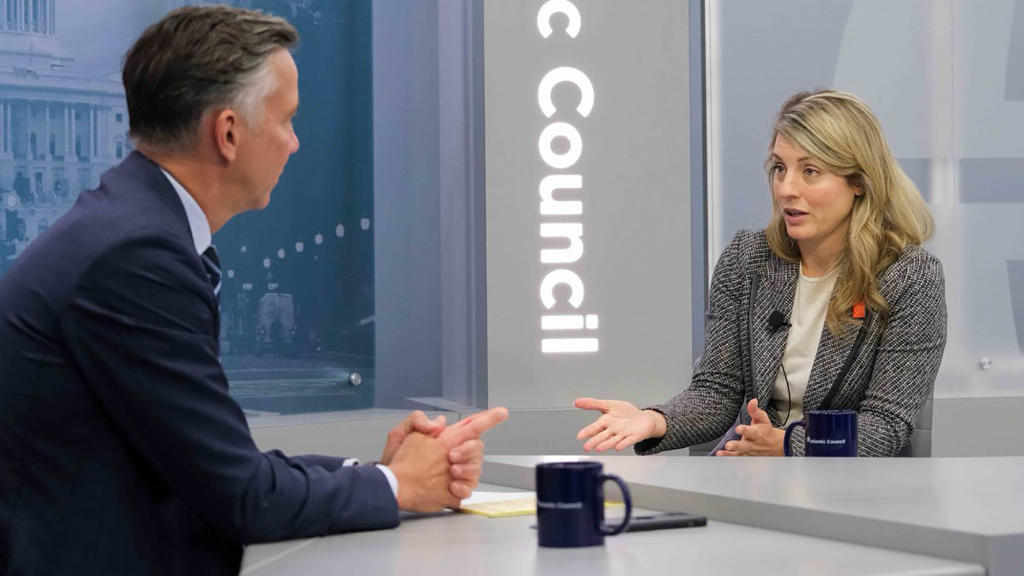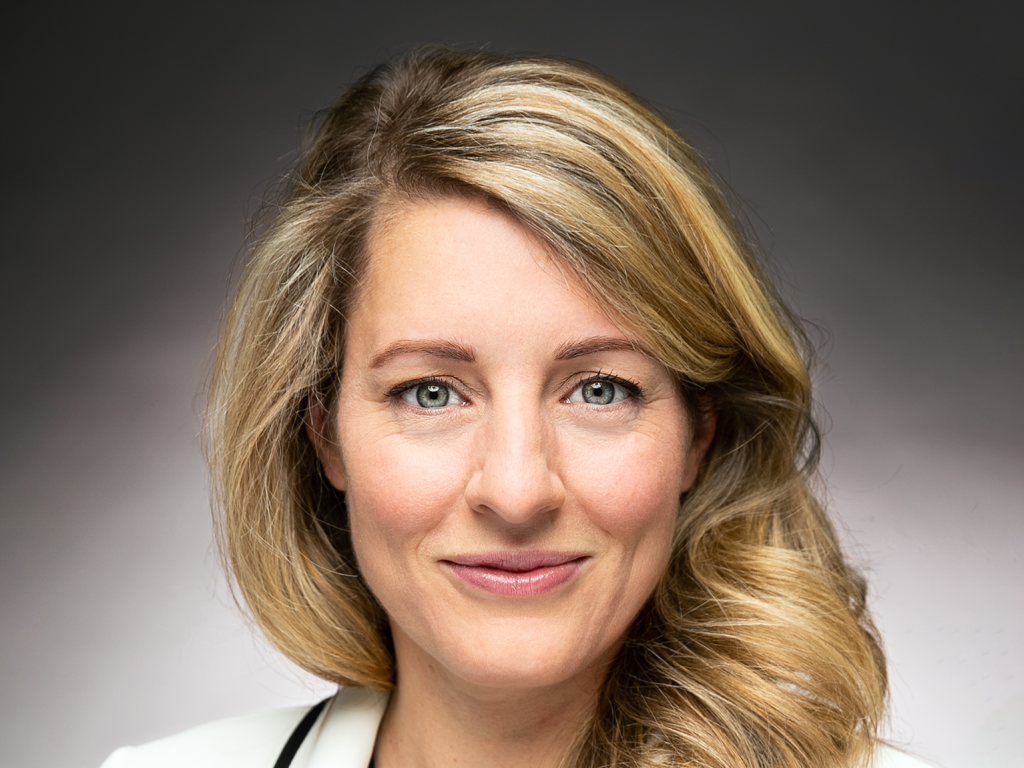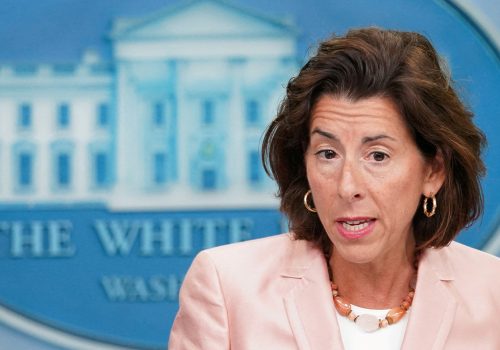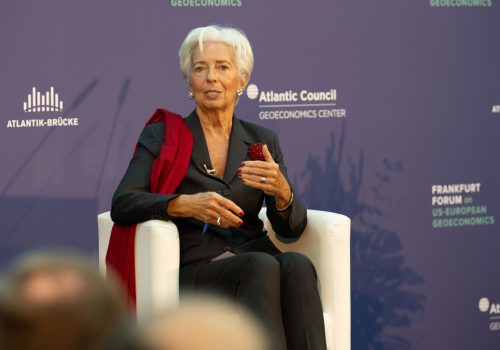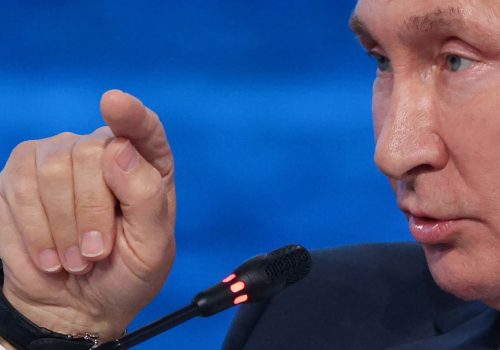Watch the full event
Russian President Vladimir Putin’s move to annex four regions of Ukraine on Friday prompted international outrage. The message from Ottawa to its Western allies: Stay the course.
“We will never recognize these sham referendums… these are Ukrainian territories,” Canadian Foreign Minister Mélanie Joly said at an Atlantic Council Front Page event on Friday. “We have been clear about that, and therefore our strategy won’t change. And that’s important for the world to know.”
The response from Kyiv on Fridady was for Ukrainian President Volodymyr Zelenskyy to ask for fast-track accession to NATO, and “we are in favor of their accession,” Joly said. At the same time, she added, “we want to make sure we do things to avoid an [even larger] international conflict.”
Joly discussed how Canada has responded to Russian aggression, the importance of Western unity in that response, and the global energy crisis with CNN anchor and chief national security correspondent Jim Sciutto. Here are some more highlights from their conversation.
How to fight back
- Canada recently passed a law allowing it to sell seized Russian assets to fund Ukrainian reconstruction and “compensate victims,” Joly said, a move other Western allies have yet to take. She’s now working on regulations to implement the law. “We’re the first ones to go ahead so we want to do it well,” Joly said.
- A broader aim of Canada’s strategy is to “isolate—diplomatically, politically, and economically—Russia,” Joly said.
- As for Putin’s threats in recent days to employ weapons of mass destruction in Ukraine, Joly added that “we need to plan” in case the Russian leader does use a nuclear weapon.
- The headlines in recent days have also been dominated by the apparent sabotage of the Nord Stream gas pipelines—and evidence suggesting that Moscow was behind it. Joly said the investigation is ongoing, and she’s been in close touch with other foreign ministers about it. “We want to make sure we do things in the right way, but we’re not naïve,” she said.
- Next week, Joly said she will meet with Latin American officials at the Organization of American States to discuss how to counteract Russia’s efforts in the Global South to blame the West for rising food costs resulting from Russia’s war on Ukraine. “We need to show up,” she said. “We need to be there to offer funding, and we need to be there to offer concrete solutions.” To this end, she added, Canada is increasing its agricultural production.
Political winds
- Aside from meeting with her US counterpart, Secretary of State Antony Blinken, Joly said a big goal for her trip to Washington was to understand the midterm elections. After meeting with key members of Congress on both sides of the aisle, Joly said she is confident that support for Ukraine in Congress will remain strong regardless of which party is in control.
- “We also have in mind 2024,” Joly said, referring to the US presidential elections and alluding to the tensions between Canada and the United States under the Trump administration. “We must be resilient. I’m in charge of making sure we have a strong relationship between the US and Canada, but we are also very much eyes wide open.”
- There are also questions about whether Europe can remain united in backing Ukraine as energy-price spikes fuel political turmoil across the continent. “But what I’m hearing from my foreign minister colleagues and friends is that the resolve is extremely strong,” Joly said.
- The biggest reason for that resides in the Kremlin. “President Putin reinforced NATO more than anything,” she said. “There’s nothing like having one villain to be all against.”
China and beyond
- “First and foremost, we are an Indo-Pacific country,” Joly said. Even as Canada prioritizes transatlantic relations, she said “we need to turn west”—across the Pacific.
- It’s important to work with China on issues such as climate change, health, and biodiversity “because these are cross-border issues,” she noted.
- But “we have to make sure that we recognize the importance of international rules in the sense that the Taiwan Strait is an international strait,” Joly added. While she wouldn’t directly address how Canada and its allies would respond if China were to invade Taiwan, Joly pointed out that US and Canadian frigates passed through the strait recently, and “we’ll continue to go.”
Daniel Malloy is the deputy managing editor at the Atlantic Council.
Watch the full event
Further reading
Thu, Sep 29, 2022
Commerce Secretary Raimondo: Corporate America is increasingly considering pulling out of China
New Atlanticist By
At an Atlantic Council Front Page event, US Secretary of Commerce Gina Raimondo offered a glimpse into the high-stakes race between the United States and China to dominate tech and other sectors.
Wed, Sep 28, 2022
ECB chief Christine Lagarde: ‘Our primary objective is price stability’
New Atlanticist By
Europe's top banker shares her thoughts on the inflation crisis and much more during the Atlantic Council's Frankfurt Forum.
Tue, Sep 27, 2022
What’s Congress’ role in holding Putin accountable? US senators discuss their next moves.
New Atlanticist By Katherine Walla
Sens. Jeanne Shaheen and Thom Tillis called upon allies to boost their support for Ukraine not only for the country’s sovereignty but also for the region’s stability and for the sake of the international order.
